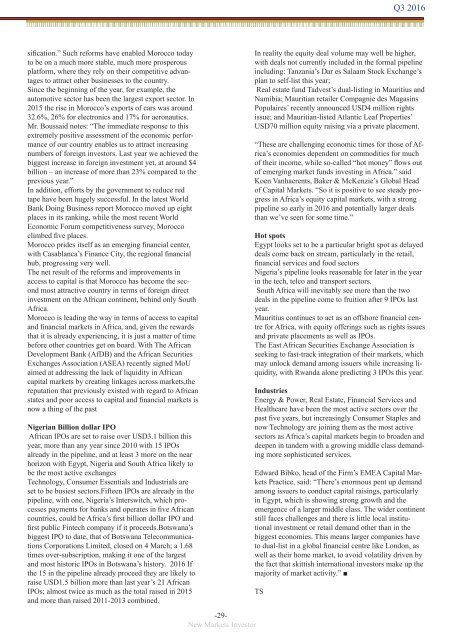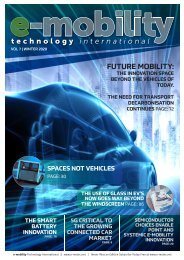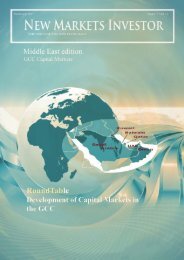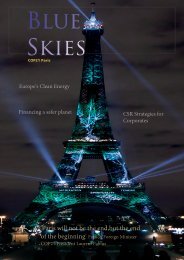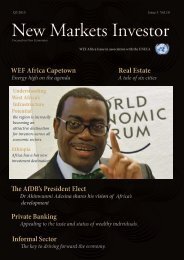Q4 2018 New Markets Investor
The magazine targets an audience of corporate and private investors, but its lucid voice makes it intelligible and essential reading for anybody who wants to understand investment strategies and markets in the 21st century.
The magazine targets an audience of corporate and private investors, but its lucid voice makes it intelligible and essential reading for anybody who wants to understand investment strategies and markets in the 21st century.
You also want an ePaper? Increase the reach of your titles
YUMPU automatically turns print PDFs into web optimized ePapers that Google loves.
Q3 2016<br />
sification.” Such reforms have enabled Morocco today<br />
to be on a much more stable, much more prosperous<br />
platform, where they rely on their competitive advantages<br />
to attract other businesses to the country.<br />
Since the beginning of the year, for example, the<br />
automotive sector has been the largest export sector. In<br />
2015 the rise in Morocco’s exports of cars was around<br />
32.6%, 26% for electronics and 17% for aeronautics.<br />
Mr. Boussaid notes: “The immediate response to this<br />
extremely positive assessment of the economic performance<br />
of our country enables us to attract increasing<br />
numbers of foreign investors. Last year we achieved the<br />
biggest increase in foreign investment yet, at around $4<br />
billion – an increase of more than 23% compared to the<br />
previous year.”<br />
In addition, efforts by the government to reduce red<br />
tape have been hugely successful. In the latest World<br />
Bank Doing Business report Morocco moved up eight<br />
places in its ranking, while the most recent World<br />
Economic Forum competitiveness survey, Morocco<br />
climbed five places.<br />
Morocco prides itself as an emerging financial center,<br />
with Casablanca’s Finance City, the regional financial<br />
hub, progressing very well.<br />
The net result of the reforms and improvements in<br />
access to capital is that Morocco has become the second<br />
most attractive country in terms of foreign direct<br />
investment on the African continent, behind only South<br />
Africa.<br />
Morocco is leading the way in terms of access to capital<br />
and financial markets in Africa, and, given the rewards<br />
that it is already experiencing, it is just a matter of time<br />
before other countries get on board. With The African<br />
Development Bank (AfDB) and the African Securities<br />
Exchanges Association (ASEA) recently signed MoU<br />
aimed at addressing the lack of liquidity in African<br />
capital markets by creating linkages across markets,the<br />
reputation that previously existed with regard to African<br />
states and poor access to capital and financial markets is<br />
now a thing of the past<br />
Nigerian Billion dollar IPO<br />
African IPOs are set to raise over USD3.1 billion this<br />
year, more than any year since 2010 with 15 IPOs<br />
already in the pipeline, and at least 3 more on the near<br />
horizon with Egypt, Nigeria and South Africa likely to<br />
be the most active exchanges<br />
Technology, Consumer Essentials and Industrials are<br />
set to be busiest sectors.Fifteen IPOs are already in the<br />
pipeline, with one, Nigeria’s Interswitch, which processes<br />
payments for banks and operates in five African<br />
countries, could be Africa’s first billion dollar IPO and<br />
first public Fintech company if it proceeds.Botswana’s<br />
biggest IPO to date, that of Botswana Telecommunications<br />
Corporations Limited, closed on 4 March; a 1.68<br />
times over-subscription, making it one of the largest<br />
and most historic IPOs in Botswana’s history. 2016 If<br />
the 15 in the pipeline already proceed they are likely to<br />
raise USD1.5 billion more than last year’s 21 African<br />
IPOs; almost twice as much as the total raised in 2015<br />
and more than raised 2011-2013 combined.<br />
In reality the equity deal volume may well be higher,<br />
with deals not currently included in the formal pipeline<br />
including: Tanzania’s Dar es Salaam Stock Exchange’s<br />
plan to self-list this year;<br />
Real estate fund Tadvest’s dual-listing in Mauritius and<br />
Namibia; Mauritian retailer Compagnie des Magasins<br />
Populaires’ recently announced USD4 million rights<br />
issue; and Mauritian-listed Atlantic Leaf Properties’<br />
USD70 million equity raising via a private placement.<br />
“These are challenging economic times for those of Africa’s<br />
economies dependent on commodities for much<br />
of their income, while so-called “hot money” flows out<br />
of emerging market funds investing in Africa.” said<br />
Koen Vanhaerents, Baker & McKenzie’s Global Head<br />
of Capital <strong>Markets</strong>. “So it is positive to see steady progress<br />
in Africa’s equity capital markets, with a strong<br />
pipeline so early in 2016 and potentially larger deals<br />
than we’ve seen for some time.”<br />
Hot spots<br />
Egypt looks set to be a particular bright spot as delayed<br />
deals come back on stream, particularly in the retail,<br />
financial services and food sectors<br />
Nigeria’s pipeline looks reasonable for later in the year<br />
in the tech, telco and transport sectors.<br />
South Africa will inevitably see more than the two<br />
deals in the pipeline come to fruition after 9 IPOs last<br />
year.<br />
Mauritius continues to act as an offshore financial centre<br />
for Africa, with equity offerings such as rights issues<br />
and private placements as well as IPOs.<br />
The East African Securities Exchange Association is<br />
seeking to fast-track integration of their markets, which<br />
may unlock demand among issuers while increasing liquidity,<br />
with Rwanda alone predicting 3 IPOs this year.<br />
Industries<br />
Energy & Power, Real Estate, Financial Services and<br />
Healthcare have been the most active sectors over the<br />
past five years, but increasingly Consumer Staples and<br />
now Technology are joining them as the most active<br />
sectors as Africa’s capital markets begin to broaden and<br />
deepen in tandem with a growing middle class demanding<br />
more sophisticated services.<br />
Edward Bibko, head of the Firm’s EMEA Capital <strong>Markets</strong><br />
Practice, said: “There’s enormous pent up demand<br />
among issuers to conduct capital raisings, particularly<br />
in Egypt, which is showing strong growth and the<br />
emergence of a larger middle class. The wider continent<br />
still faces challenges and there is little local institutional<br />
investment or retail demand other than in the<br />
biggest economies. This means larger companies have<br />
to dual-list in a global financial centre like London, as<br />
well as their home market, to avoid volatility driven by<br />
the fact that skittish international investors make up the<br />
majority of market activity.” ■<br />
TS<br />
-29-<br />
<strong>New</strong> <strong>Markets</strong> <strong>Investor</strong>


